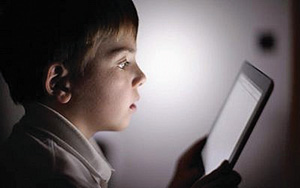
Camp Morasha’s new technology policy, which was introduced during this past summer season, was crafted with considerable uncertainty and hesitation. Having participated in numerous planning discussions, I will be the first to confess my own initial reluctance and doubt. To be clear, I fully recognize and appreciate the benefits of creating opportunities that allow us to disconnect from the myriad of technological outlets to which we have become attached. Nonetheless, the plan that we thoughtfully deliberated and ultimately executed, seemed overly ambitious and bold. Let’s be honest; electronic devices, in all of their forms, have become set fixtures in all of our spaces and places. From our homes to the workplace, from schools to the playground and from shul to the streets, screens are everywhere. Can one reasonably assume that a complete ban on all screened devices would be met with success?
Children of all ages spend many of their waking hours interacting with screens. Indeed, many parents are thoughtful and deliberate in their setting appropriate limits and controls and seek to regulate the use of technology by the children under their care. Parental supervision and oversight notwithstanding, it has become increasingly challenging to adequately and effectively enforce limits and guidelines. The reality is that many of the challenges we face today are unique and without precedent. For many parents and educators, it often feels as if we are chasing a moving target.
A sleep-away camp setting can accommodate technology regulation and control, in a manner that would likely seem impossible in other settings. And so, during this summer season, we conducted a critical experiment; one which would ultimately provide us with greater insight into our social and behavioral state of health. For seven weeks, our beautiful scenic campus functioned as a laboratory; our campers and staff, as the participating subjects. Truthfully, in recent years, we had already observed that our campers and staff could successfully manage without devices that would allow them to connect wirelessly with each other and with the world around them. And, despite the predictable mild symptoms of technology withdrawal, our staff and campers successfully rose to the challenge.
But this year, we dared to dream of taking it to the next level. What if we eliminated screens altogether? What unforeseeable consequences we would face upon disarming 1,300+ campers and staff members, of any and all handheld assistants? Granted, we knew they would survive without the convenience of a calculator and the benefits of being able to access the weather, anytime and anywhere. But there were some genuine concerns. After a long day of intense physical activity, won’t many, if not at least some, of our campers need the assistance of a device to help them relax? Would they be able to comfortably rest and fall asleep without being able to unwind with a game, watch a video, or simply look at some pictures? And what about those long rainy days, or when a sudden change in the weather forced them from the fields and courts into their bunks? How would they manage to stay focused and remain calm? What would they do when forced to confront those inevitable moments of boredom? And then, of course, there are the fast days. Despite the late wakeups and the creative and inspiring programming, the mid-summer fast days are long and challenging for kids, under all circumstances. Would our campers display the fortitude and possess the skills that would enable them to manage under these unfamiliar conditions?
On Monday, July 1, as our campers arrived at camp, all screened devices were collected. We prepared ourselves for the initial fallout, especially when the lights went out that first night. And then we waited. And waited. And waited. Almost instantaneously, something remarkable occurred and continued throughout the weeks that followed. The participants in this grand experiment seemed to display a genuine sense of freedom. Rather than rebel, they seemed noticeably at ease, as they were suddenly released from the digital shackles that often hold us captive. They celebrated their newfound freedom by interacting with each other in ways that, not all that long ago, were considered normal human behaviors. They sat around, at times for long periods at end, and looked up and forward, rather than down and away. We even witnessed the resurrection of “initial baseball,” a timeless classic, all but lost in today’s world. But most importantly, they looked at each other. Not a passing glance here and there; they really looked at each other. They spoke with one another and
interacted with nature and with the world around them, without the constant distraction of chirps, buzzes, beeps and the powerful allure of those glaring screens that so often hijack our attention.
Were there moments throughout the summer when they longed for their devices? Of course there were. Were there occasional requests to grant them temporary access to their screens? Most definitely. And that should come as a shock to no one. But what did surprise many was the ease and the degree to which this initiative succeeded. Yesterday, as our children boarded the buses and prepared to go back home, we returned their devices to them. For now, this experiment has come to an end. But for a fleeting moment, our campers have given us reason to pause and consider, with greater reflection, the world in which they are being raised and the choices that we, as their parents, are constantly making. If I have learned anything over the past seven weeks it is that our children crave so deeply for direct contact and for genuine connection with each other, with the world around them, and with themselves.
By Rabbi Larry Rothwachs
Rabbi Larry Rothwachs serves as senior rabbi of Congregation Beth Aaron in Teaneck, and director of professional rabbinics at the Rabbi Isaac Elchanan Theological Seminary. He also serves as the head rabbi at Camp Morasha.













